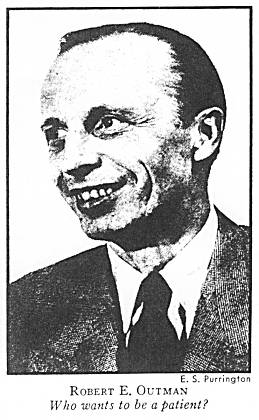SMALL BUSINESS
Big Troubles for Little Men
More than 60% of U.S. production comes from small business (annual gross sales under $5
million). Nearly 80% of industrial labor is employed in small plants (with less than 1,000
on their payrolls). Last week an executive of one such concern went into print with the charge
that this vital segment of the U.S. industrial economy was being squeezed to death. In an
article in The Atlantic Monthly, building-insulation maker Robert E. Outman said:
“While the labor leaders, industrial giants, and various Federal agencies jockey for top
spots in the new era of push-button prosperity, the small manufacturers cannot even get the
material to make the push buttons. Their labor costs rise whenever the powerful unions effect
a wage boost, the cost of their raw materials goes up whenever the large corporations break
through a price ceiling, and the daily changes in Federal rules multiply their clerical work
and overhead costs.”
Too Much Talk. Outman illustrated his point with an account of his own experiences as
executive vice president of Chicago's United States Mineral Wool Co. Shortly after V-J day, he
signed a new contract with his 250 employes (A.F. of L.'s Auto Workers Union) which provided
for no pay increases for twelve months. Why did the employes agree to such a contract?
“Like most small industries, we had a postwar expansion plan which meant more money
for owners and workers, and the men in the shops expected to have a fair share of the profits when,
but not before, the expansion program paid off.”
But Outman's employes were not content for long. Soon after they had signed, they heard
President Truman's wage-price policy speech, in which he declared that industry as a whole
could afford substantial wage increases without price increases. The ability of big business to
absorb the higher wage costs, said Manufacturer Outman, put smaller concerns at a disadvantage
in the competition for efficient labor. The end result: “a production slowdown throughout
the small manufacturing concerns.”
Too Much Medicine? The basic trouble, according to Outman: “The Government
has continued to handle the peace as though it were a depression. The 'emergency' planners
have tried to doctor up a once healthy situation with so many panic policies that industry, the
unwilling patient, is sick from too much of the wrong kinds of medicines.
“...Small manufacturers...are sick and tired of Federal 'assistance.' We won our
share of the war despite the bureaucrats, and we will fight as hard for the peace, but
industry needs a free hand, not still more helping hands... Difficult as it may be for the
[Government] expediters to believe this, their plans invariably waste the small manufacturers'
precious time....
“The small manufacturers, whose production is most needed, would rather take their
chances on the open market, where speed and ingenuity pay off. When we need spare parts, we
need them at once and not at the end of a five-week exchange of correspondence with
Washington. We have better luck with junk yards than priorities.”

